Inventory of relevant SOGIESC case law and pending cases before the ECtHR and CJEU 2025
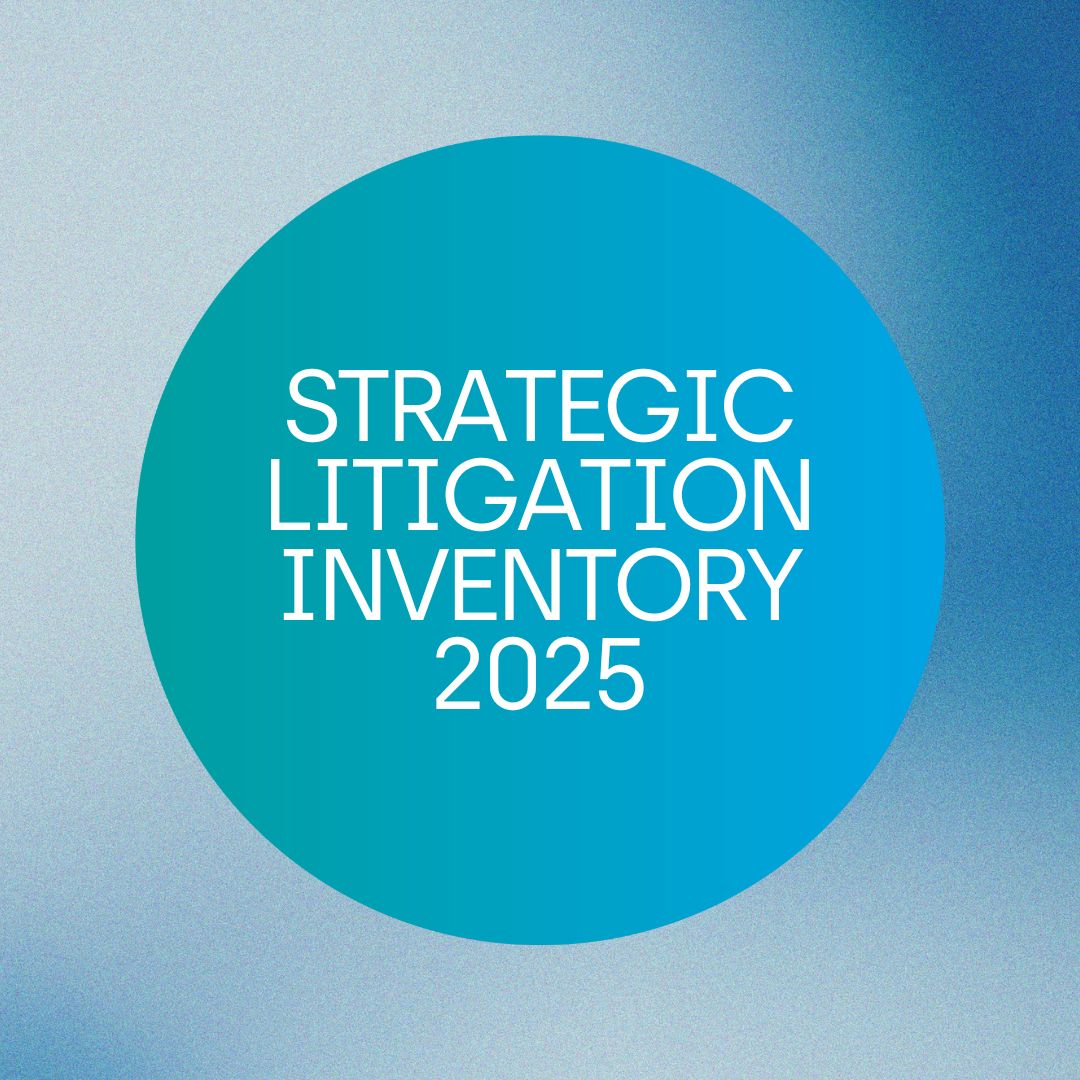
In order to focus our strategic litigation efforts across Europe to fully protect and advance LGBTI rights, with this inventory ILGA-Europe wants to support members and partners across the region to identify trends and gaps in protection at the European level, which can commonly be tackled through litigation. The inventory can further strengthen cooperation and help guide our work and efforts by others in bringing forward and supporting strategic cases.
This inventory and continuous assessment of the European landscape informs ILGA-Europe’s ongoing engagement in strategic litigation through identification and support of strategic opportunities.
This inventory covers relevant SOGIESC cases from 2010 up until December 2024.
Annual Review 2025
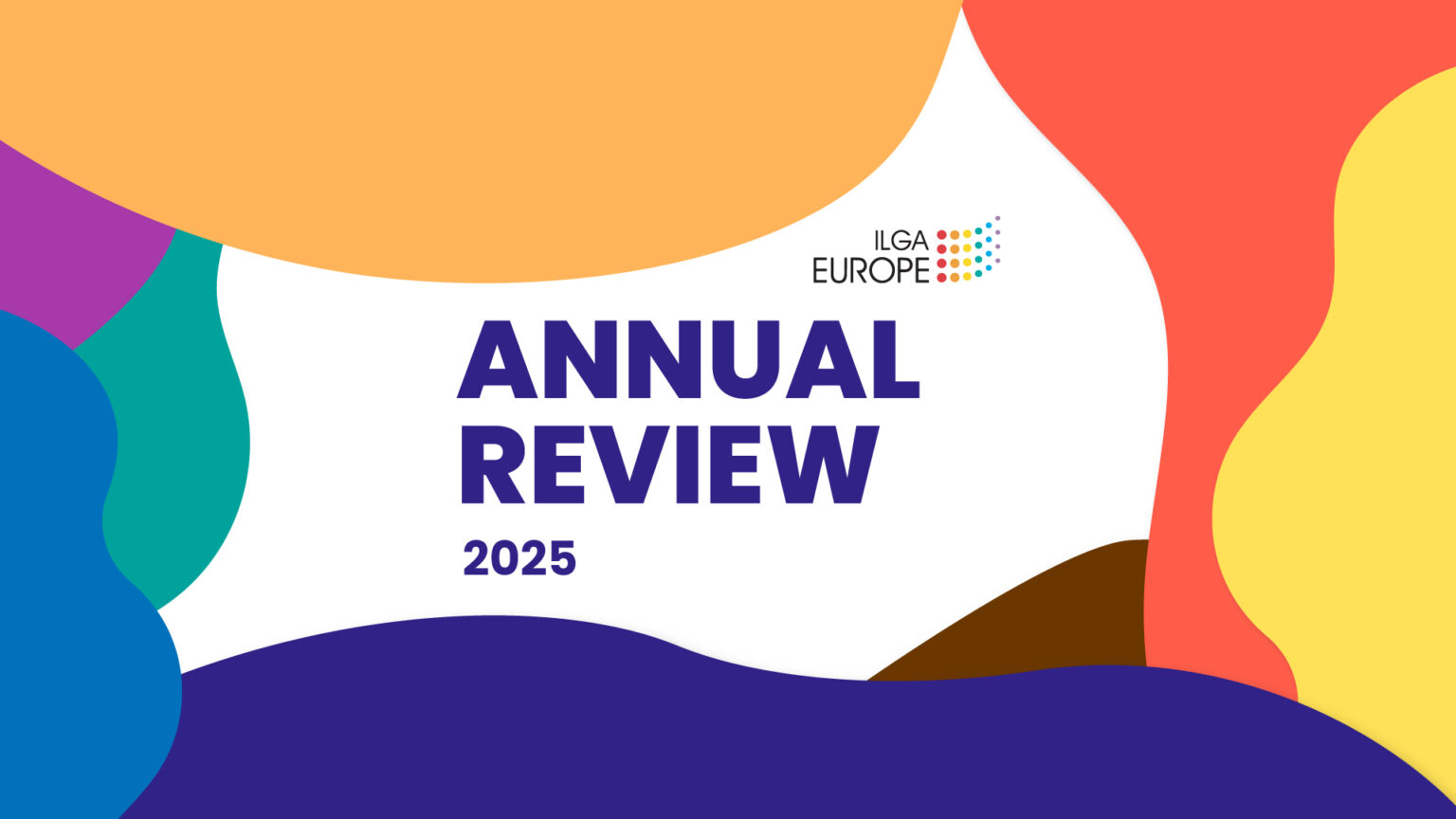
Below you can select Annual Review 2025 by topic and download the highlights and trends from this edition.
Select your topic
Choose a section of the Annual Review to preview:
2025 HIGHLIGHTS AND TRENDS
Here are the key overview findings of this edition of the Annual Review. To access all our analysis, download the full trends report.
1. Increasing restrictions
In seven countries, so-called ‘LGBT propaganda’ laws have been enacted or proposed, criminalising visibility and restricting discussion of LGBTI issues. In parallel, ‘foreign agent’ laws targeting NGOs have been either proposed or introduced in Bulgaria, Georgia, Hungary, and Montenegro, forcing LGBTI organisations to register as foreign-funded entities.
2. Education being leveraged
These laws have been increasingly leveraged in education sectors, restricting or entirely preventing the inclusion of LGBTI issues in curricula and awareness-raising initiatives. In addition, attempts to introduce legislation excluding LGBTI topics from sex education were recorded in Bulgaria, Hungary, Italy, the Netherlands, Luxembourg, Norway, Romania, Russia and Slovakia.
3. Consequences of the normalisation of hate speech
Hate crimes have reached record levels, fuelled by a normalisation of hate speech by political and religious leaders. At the same time, fear-mongering is being used to justify restrictions on trans healthcare in countries such as Georgia, Hungary, Ireland, Romania, and the United Kingdom.
4. Arbitrary asylum rejections
As governments intensify their crackdowns, LGBTI individuals are being forced to flee, yet many European countries—including Austria, Belgium and Ireland—are denying asylum claims on arbitrary grounds, with applicants rejected for not seeming ‘gay enough’.
5. Courts upholding LGBTI human rights
While governments are increasingly scapegoating LGBTI people to push restrictive laws, the courts both in the EU and across Europe are in turn upholding LGBTI human rights, with key judgements on procedures for LGBTI asylum seekers, anti-LGBTI hate speech, freedom of association and expression, legal gender recognition, and sexual and reproductive rights.
Our submission to the EC 2025 Rule of Law report
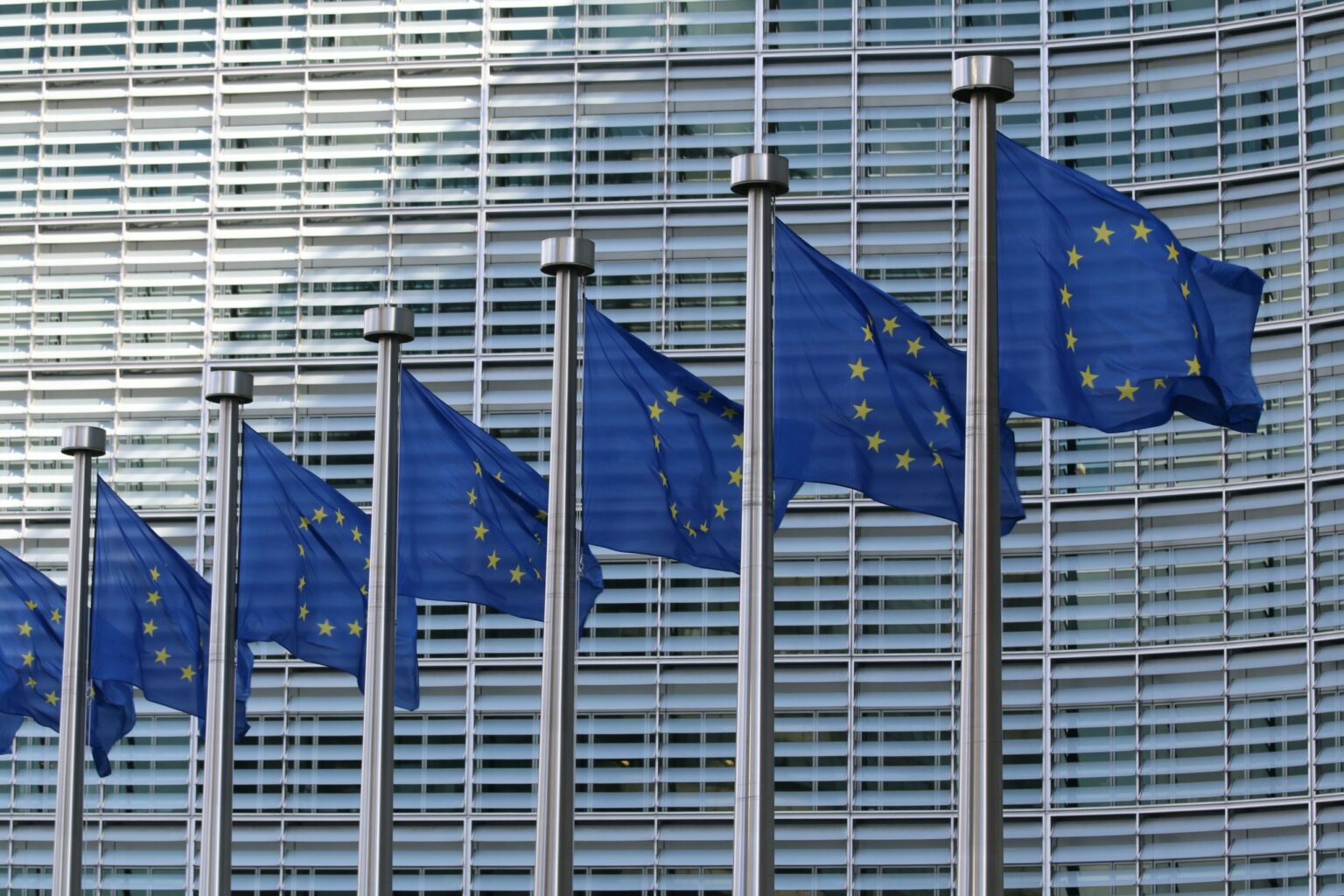
After a year of elections across the EU, threats to democracy and the rule of law are growing both in Europe and globally. Our submission highlights more clearly than ever the connection between these threats and the instrumentalisation of LGBTI people.
Disinformation, hate speech, and discriminatory political discourse have surged in many countries, directly impacting the lives of LGBTI people. At the same time, violence and restrictive legislation against LGBTI individuals are increasing, undermining the rule of law.
State of Play: SOGIESC protections in the Council of Europe region
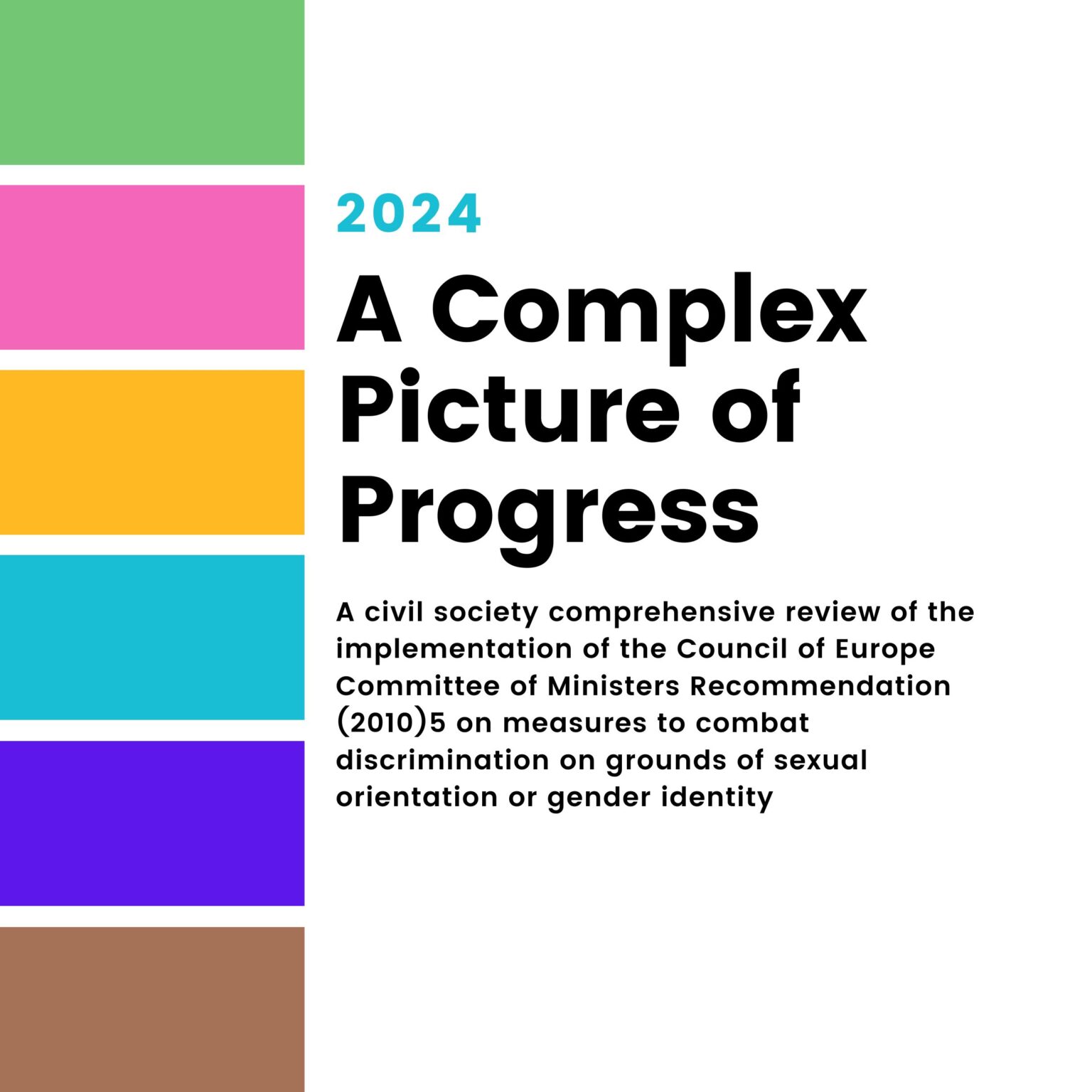
The Council of Europe (COE) is currently conducting its 3rd review of the implementation of the Committee of Ministers Recommendation CM/Rec(2010)5, which outlines measures to combat discrimination based on sexual orientation and gender identity. In response to this process, ILGA-Europe has prepared a regional report in collaboration with IGLYO, along with input from 27 member organisations and other regional LGBTI networks, to reflect on the progress made since the adoption of the Recommendation in 2010.
A mixed picture of progress
The report presents a complex reality. While some CoE member states have taken significant steps forward, others have stagnated or even regressed in their protections of LGBTI people. Key areas of concern include access to legal gender recognition, protection from violence, and equal treatment in education, healthcare, and employment.
However, there are also positive developments. In the 14 years since the adoption of the Recommendation, progress has been made across the region, demonstrating that equality is achievable when governments work closely with civil society. The report calls on the Council of Europe to fully incorporate civil society perspectives into its upcoming 2025 regional report, alongside self-assessments made by member states, ensuring that the voices of LGBTI people are heard and acted upon.
About the report
This review draws on the input of civil society organisations from 27 Council of Europe member states. Organisations completed a detailed questionnaire, which aligns with the thematic areas of the original 2010 Recommendation. The questionnaire gathered both quantitative and qualitative data on key areas such as:
- Right to life, security, and protection from violence
- Legal gender recognition
- Freedom of association and expression
- Non-discrimination in health, education, employment, and housing
- Protection of LGBTI children and young people
To provide a thorough analysis, this data was supplemented with consultations with national authorities, desk research, and ILGA-Europe’s own monitoring efforts. The report also benefited from contributions by other European networks, including TGEU, OII-Europe, and EL*C, ensuring a comprehensive look at the progress and setbacks in LGBTI rights across the region.
Contributing organisations
This report would not have been possible without the contributions of the following civil society organisations:
- Albania: Alliance Against Discrimination of LGBTI (Aleanca LGBTI)
- Bosnia & Herzegovina: Sarajevo Open Center
- Bulgaria: Youth LGBT organization Deystvie (Deystvie), Single Step
- Croatia: Za Pravo; Proces – udruga za promicanje queer kulture i LGBTIQ+ prava
- Cyprus: Accept LGBTI+ CYPRUS, Queer Cyprus Association, Queer Collective CY
- Czechia: Transparent, Jsme fér, In-Iustitia
- Finland: SETA – LGBTI rights in Finland
- France: Human Development Research Initiative
- Georgia: Equality Movement, Tbilisi Pride, Georgian Young Lawyers Association, Georgian Democratic Initiative
- Greece: Colour Youth – Athens LGBTQ Youth Community
- Hungary: Háttér Society, Transvanilla Transgender Association
- Ireland: LGBT Ireland
- Italy: Rete Lenford – Avvocatura per i Diritti LGBTI+
- Lithuania: National LGBTI Rights Organization LGL (Lithuanian Gay League, LGL)
- Montenegro: Association Spectra, LGBT Forum Progress, Montenegrin LGBTIQ+ Association Queer Montenegro
- North Macedonia: TransFormA, Coalition Margins
- Poland: Lambda Warsaw Association, Love Does Not Exclude Association, Helsinki Foundation for Human Rights, Interaction Foundation, Transprzyjaźń, tranzycja.pl (with input from independent scholar Kornel Sobczak)
- Portugal: Associação ILGA Portugal, Rede ex aequo
- Republic of Moldova: GENDERDOC-M Information Centre
- Romania: Asociația Pride
- Serbia: Labris, Kolektiv Talas TIRV/Collective wave TIGV
- Slovak Republic: Saplinq, o.z.
- Slovenia: Association Cultural, Informational and Counseling Center Legebitra
- Spain: Federación Estatal de Lesbianas, Gais, Trans, Bisexuales, Intersexuales y más (FELGTBI+)
- Türkiye: SPoD, ÜniKuir
- Ukraine: Gender Stream
- United Kingdom: Mermaids
Additionally, contributions to the final report were made by the Eurocentralasian Lesbian* Community (EL*C), Organisation Intersex International Europe (OII Europe), and Trans Europe and Central Asia (TGEU).
Rainbow Map 2024
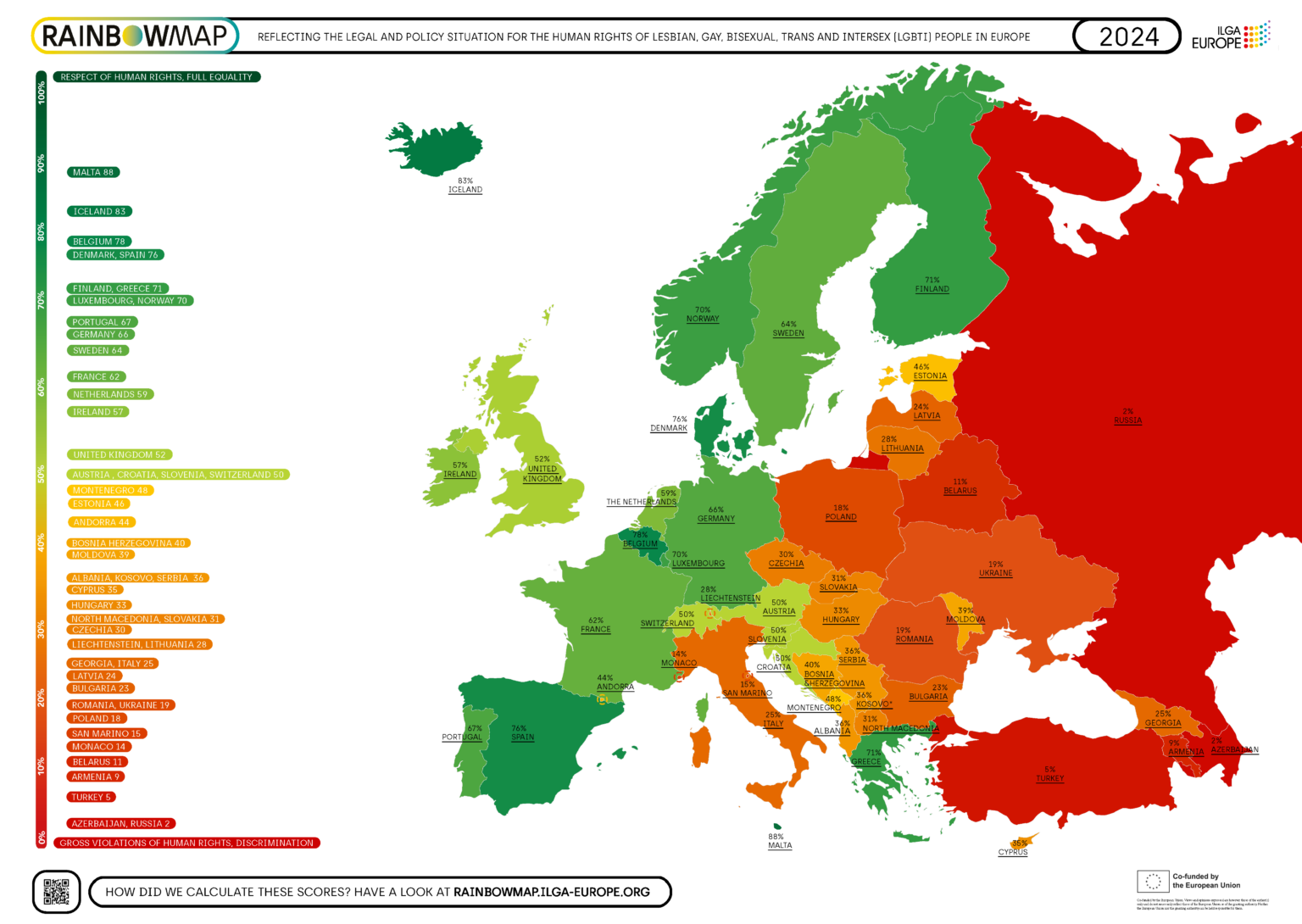
Published on May 15 by Europe’s leading LGBTI organisation, ILGA-Europe, the 16th annual Rainbow Map, which ranks 49 European countries on legislative developments in the arena of LGBTI human rights, shows that while authoritarian leaders across Europe continue to use the scapegoating of LGBTI people to divide and mobilise their electorates, others are conversly showing robust political will to honour commitments to advancing and protecting the human rights of LGBTI people. Read more in our press release.
About the Rainbow Map
The Rainbow Map – ILGA-Europe’s annual benchmarking tool – comprises the Rainbow Map and Index and national recommendations. ILGA-Europe have produced the Rainbow Map and Index since 2009, using it to illustrate the legal and policy situation of LGBTI people in Europe.
The Rainbow Map and Index ranks European countries on their respective legal and policy practices for LGBTI people, from 0-100%.
In order to create our country ranking, ILGA-Europe examine the laws and policies in 49 countries using 75 criteria, divided between seven thematic categories: equality and non-discrimination; family; hate crime and hate speech; legal gender recognition; intersex bodily integrity; civil society space; and asylum.
The Rainbow Map and Index presents a picture of the current policy landscape, while country-specific recommendations attempt to answer the question “what’s next?” These recommendations are intended to encourage policymakers to address the most pressing legal and policy priorities within the framework of our Rainbow Map and Index. The recommendations were gathered following an online consultation with a wide range of LGBTI organisations in the various countries. As a result, the recommendations are tailored to the needs of activists working on the ground.
This year, the Rainbow Map website has been relaunched with a new look and includes features that allow for an improved visualisation of the data, as well as a more agile and user-friendly access to the information.
Executive Summary
For the ninth year in a row, Malta continues to occupy the number one spot on the Rainbow Map, with a score of 88%.
With 83 points, Iceland jumped to second place with a rise of three places as a result of the new legislation banning conversion practices and ensuring the trans-specific healthcare is based on depathologisation.
Belgium also banned conversion practices and now comes third place on the ranking with a score of 78.
The three countries at the other end of the Rainbow Map scale are Russia (2%), Azerbaijan (2%), and Turkey (5%). Russia lost 7 points and dropped 3 places because of the federal legislation banning legal gender recognition and trans-specific healthcare.
Poland still sits at the end of the EU ranking with 18% points, followed by Romania (19%) and Bulgaria (23%).
Germany, Iceland, Estonia, Liechtenstein, and Greece are the countries with the biggest jumps in scores. Germany prohibited hate crimes based on sexual orientation, gender identity, and sex characteristics. While both Estonia and Greece amended their laws to allow same-sex couples to marry and adopt children, Greece also filled the gaps in their anti-discrimination legislation to fully protect LGBTI people. Liechtenstein extended adoption rights to same-sex couples.
Montenegro lost the most points (-13%), dropping 9 places because it failed to adopt a new equality action plan or introduce updated policies on asylum and hate crime.
Alongside Montenegro, governments in Spain, Slovenia, Finland, Sweden, and many other countries failed to renew their action plans. France, Malta, Scotland and Wales adopted effective and comprehensive equality action plans.
In many countries, legislative proposals that have been on the table for years are not moving forward. This includes the hate crime legislation and proposal for recognition of same-sex partnership in Ukraine, which despite endorsement by several ministries and support throughout society is still being stalled. It also includes a draft law on legal gender recognition in Czechia that would finally get rid of the sterilisation requirement. After five years of delay, the UK government still hasn’t followed its promises on banning conversion practices. And despite many court cases and recommendations from international institutions, Lithuania didn’t progress on recognition of same-sex couples.
Belarus began categorising LGBTI content as “pornography”, restricting freedom of expression of LGBTI people. Bulgaria and Greece failed to protect LGBTI public events, thus lost points in relation to civil society space.
Both in Denmark and Poland, administrative procedures were improved for minors’ access to legal gender recognition (LGR). Although Germany and Sweden adopted new regulations for LGR, the laws have not come into effect yet, so they are not reflected on the map.
In many countries, legislative processes for new LGR procedures have been stalled this year. Similarly, no country prohibited unnecessary medical interventions on intersex children.
Most European countries still don’t include sexual orientation, gender identity or sex characteristics as qualification criteria for asylum. In an overall climate of governments increasingly undermining the international right to asylum, this ongoing omission is very worrying. This year’s only progress in this area was Czechia adding SOGI in their asylum law and Ireland providing a consistent training framework for their asylum caseworkers.
EU Enlargement Review 2024

The fundamental rights of LGBTI people need to be a core part of the accession process and EU institutions need to work with the authorities in each accession country to ensure the gaps are tackled and important pieces of legislation are advanced over the next year.
The EU enlargement process has leverage and needs to be fully used to support the adoption of important legislation protecting the fundamental rights of LGBTI people, as well as call out when governments advance laws that go against EU principle of fundamental rights, democracy and rule of law.
Over the last year, not only have we seen the worrying trends of governments challenging the rule of law, an increase in LGBTI phobic hate speech by politicians and religious leader continuing and foreign influence being exerted to challenge advances on human rights continue, but in a number of candidate and accession countries, ruling parties have been pushing legislation forward that is actively limiting the human rights of vulnerable groups including LGBTI people. We have also seen governments putting forward Russian style foreign agent laws in Georgia and Republika Srpska in Bosnia- Herzegovina. LGBTI rights are being used to polarise society, often to distract from a broader undermining of democracy and the rule of law in these countries and other more important socio- economic and political issues.
The annual enlargement report process is a key moment to remind governments of the criteria that need to be met and point out where advancement on rule of law and the protection of fundamental rights are needed to advance the process. While in some countries progress has been too slow and the EU should ensure that important legislative processes are finally seen through (such as the legal gender recognition in Montenegro and partnership recognition for same-sex partners and a new hate crimes legislation in Ukraine), it is important to be very clear that the attempts to put forward laws that actively cancel EU fundamental rights cannot be tolerated and will need to lead to a reconsideration of the status granted by the EU.
It is especially important in this context that the EU insist that the protection of LGBTI people’s human rights are a core part, as they are often falling behind the requirements. The recommendations regarding the human rights of LGBTI people in the EU enlargement reports are key in holding governments accountable to the commitments made. This also means putting an emphasis on ensuring proper implementation of the laws protecting and granting access to fundamental rights. It is key that the EU makes this a priority in all the countries, also by supporting initiatives for training and education.
Through the region of all enlargement and candidate countries, we can clearly see how foreign forces are gaining influence and are challenging alliance with EU values and fundamental rights. The strength of disinformation and anti-LGBTI sentiment being spread across the Western Balkans region, particularly in Serbia, Bosnia and Herzegovina, Montenegro and North Macedonia, has intensified even more since Russia’s war in Ukraine, with LGBTI people and civil society as targets of smear campaigns, hatred and hostility, often originating from the government level, pro-Russia forces and religious leaders. We can see the anti-gender movement gaining more ground, spreading countless hostile and hateful statements and protests, disturbing public order and democratic processes. Politicians, religious leaders and newly formed organisations were among the most common perpetrators of hate speech, which translates into actual hate and violence against LGBTI people.
The anti-rights movement, which is well funded and coordinated, has taken root strongly in the Western Balkans region in the last years. In order to stand against this increasing influence of anti- gender forces and foreign governments trying to undermine the EU rule of law and democracy, strong civil society organisations are key as they continue to build social acceptance for fundamental rights, support vulnerable groups and are a corner stone of democratic societies.
The fact that LGBTI organisations in the Western Balkans have seen EU support decrease has further weakened their work and social cohesion in those countries. A number of LGBTI organisations had to close, and many at brink of closing, while they are facing organised attacks against their physical spaces, as well as against the legal framework which protects and guarantees their equal rights. The EU must be a supporting partner to these organisations, including their views meaningfully in consultations and negotiations, modelling civil dialogue as an important part of a democratic society, and continuing to support LGBTI organisations in the region through funding in the extremely fragile context.
Strategic Framework 2024-2029
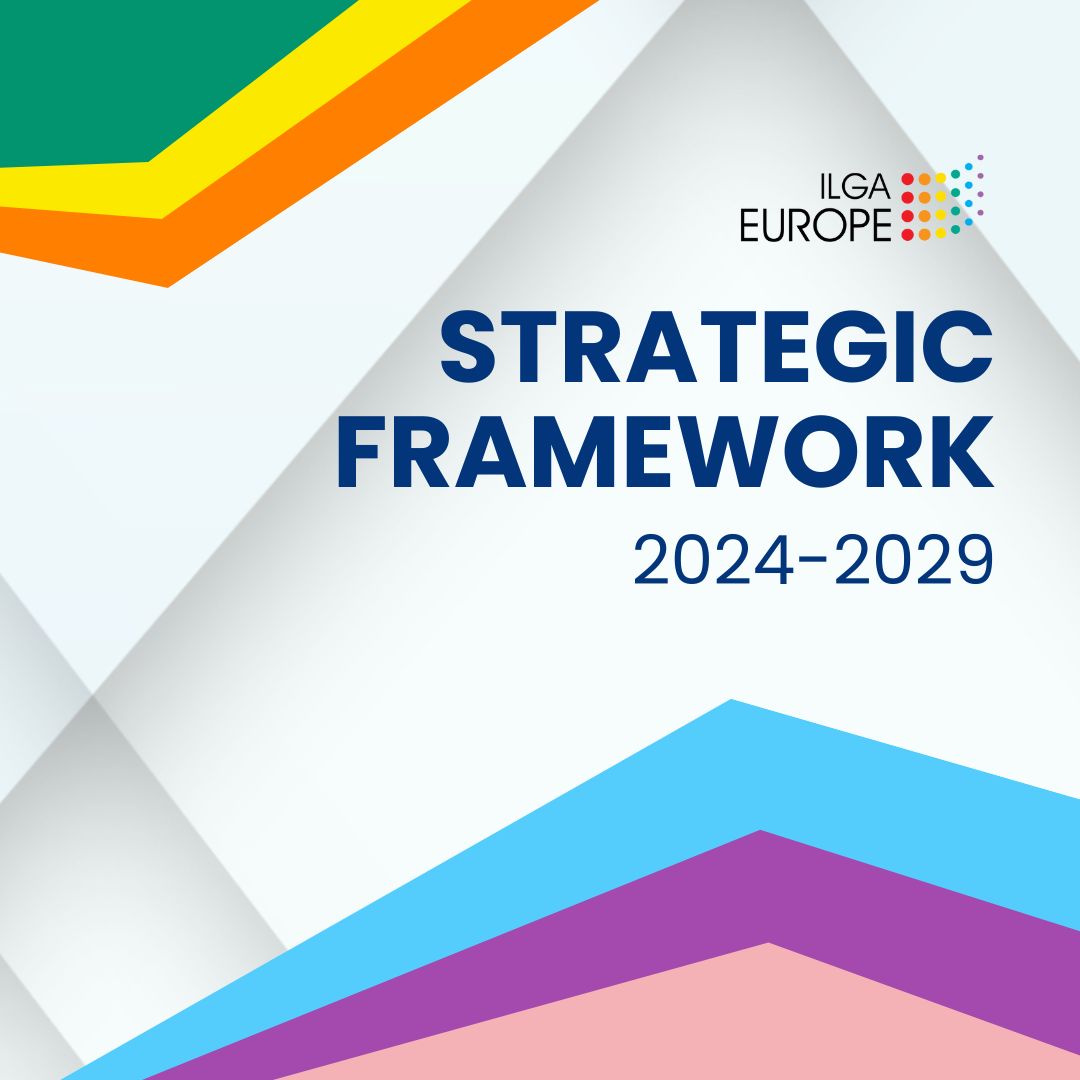
This Strategic Framework re-affirms our commitment and mandate to work with and for the LGBTI movement in all its diversity. It examines and expands on the roles ILGA-Europe will play over the next five years, where the organisation has a unique value to add and where we’re uniquely placed to play those roles.
While building on the previous Framework (2019-2023), it expands on our growing understanding of the ecosystem and strategies, and more clearly defines what we hope to achieve under each pathway: empowered and inclusive LGBTI communities, strong and growing LGBTI movements, and laws and policies recognising and protecting LGBTI people’s human rights. It also puts much more focus on working, as a movement, towards deeply-rooted social acceptance and inclusion, and towards fair, just and equal societies and economies.
Inventory of relevant SOGIESC case law and pending cases before the ECtHR and CJEU 2024
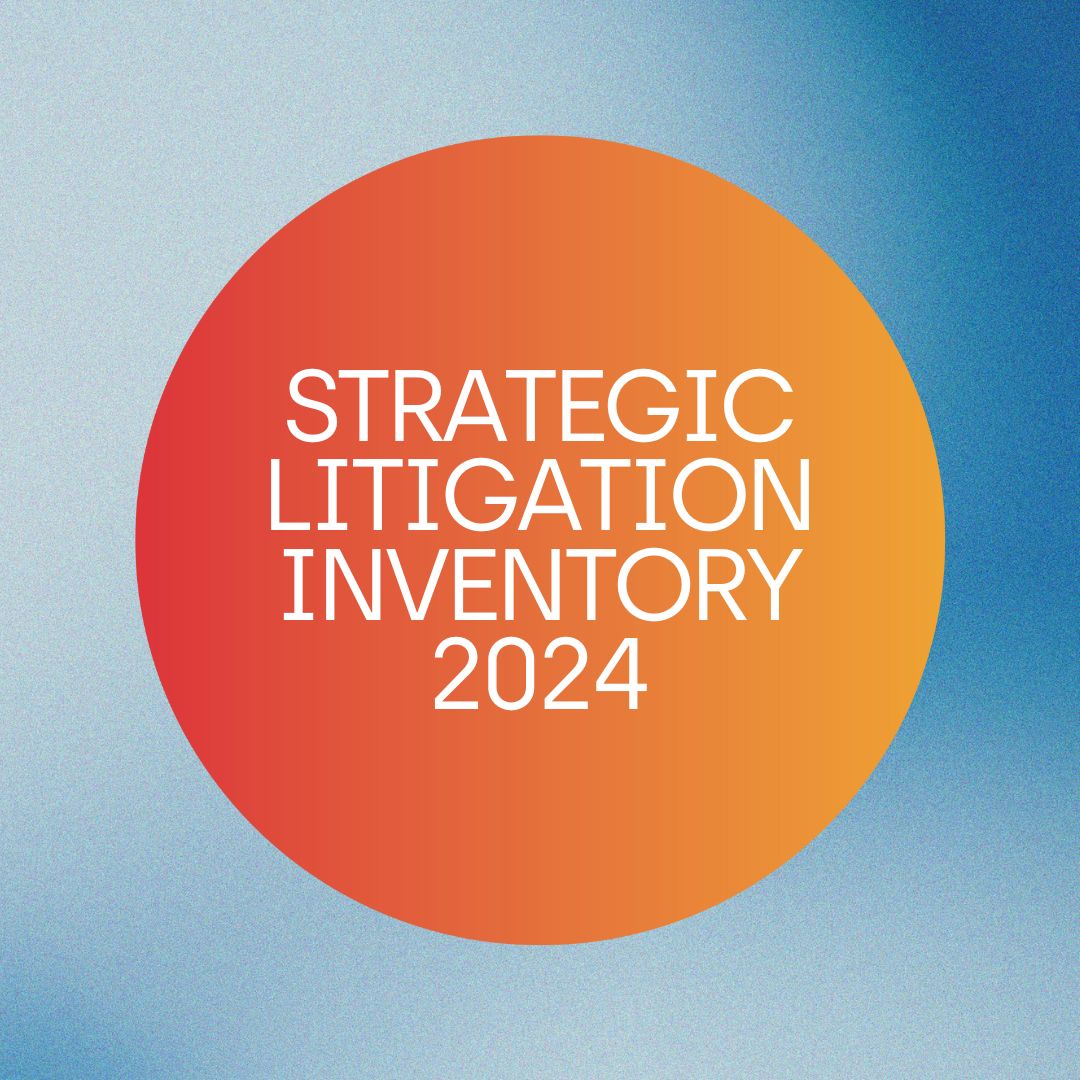
In order to focus our strategic litigation efforts across Europe to fully protect and advance LGBTI rights, with this inventory ILGA-Europe wants to support members and partners across the region to identify trends and gaps in protection at the European level, which can commonly be tackled through litigation. The inventory can further strengthen cooperation and help guide our work and efforts by others in bringing forward and supporting strategic cases.
This inventory and continuous assessment of the European landscape informs ILGA-Europe’s ongoing engagement in strategic litigation through identification and support of strategic opportunities.
This inventory covers relevant SOGIESC cases from 2010 up until December 2023.
Annual Review 2024
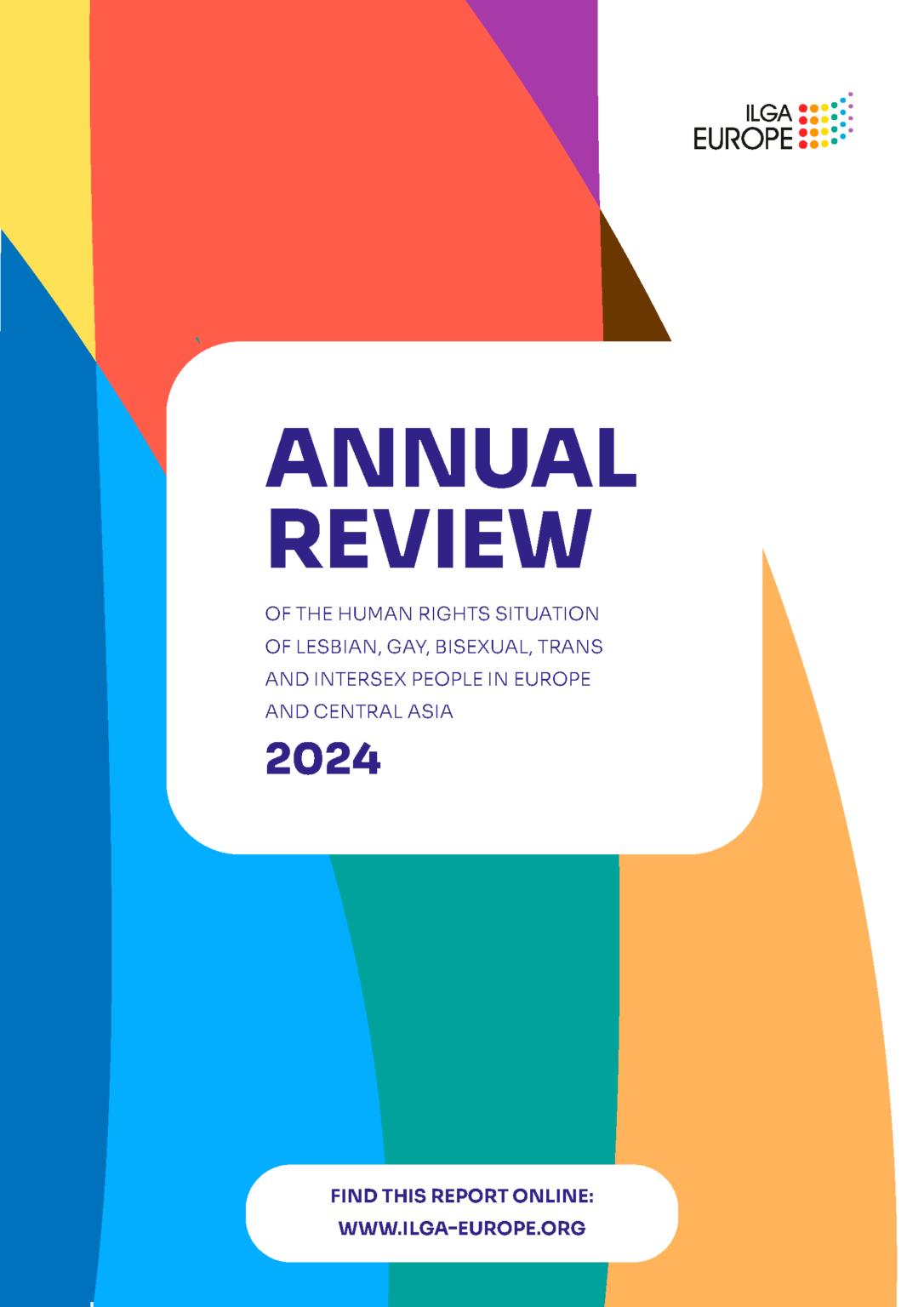
the 13th edition of our Annual Review of the Human Rights Situation of Lesbian, Gay, Bisexual, Trans and Intersex People in Europe and Central Asia.
The publication includes events that occurred between January and December 2023.
It provides a snapshot of what happened during the year, at national, regional and international levels, and it documents progress and trends regarding the human rights situation of LGBTI people.
We must warn that some parts may be potentially triggering for some readers. We must also stress that this document is not an exercise in apportioning blame. ILGA-Europe’s goal is not to point fingers at specific countries. Instead, this publication intends to serve as a tool for the exchange of best practices and policies, and as an open invitation for enhanced cooperation between governments and LGBTI civil society.
ILGA-Europe want this publication to meet our readers’ expectations and needs, and welcome any suggestions for improvement. We hope that you will find this edition of the Annual Review informative and useful.
Select INFORMATION
2024 Highlights and trends
Here are the Highlights and Trends that we currently identify for the human rights situation of lesbian, gay, bisexual, trans and intersex people in Europe and Central Asia.
Institutional Reviews
ORGANISATION FOR SECURITY AND COOPERATION IN EUROPE
Country Reviews
Themes
EQUALITY AND NON-DISCRIMINATION
FREEDOM FROM TORTURE, CRUEL, INHUMAN OR DEGRADING TREATMENT
PARTICIPATION IN PUBLIC, CULTURAL AND POLITICAL LIFE
SEXUAL AND REPRODUCTIVE RIGHTS
SOCIAL SECURITY AND SOCIAL PROTECTION
Download full report
Do you have any questions? Reach out to us at info@ilga-europe.org.
Our submission to the EC 2024 Rule of Law report
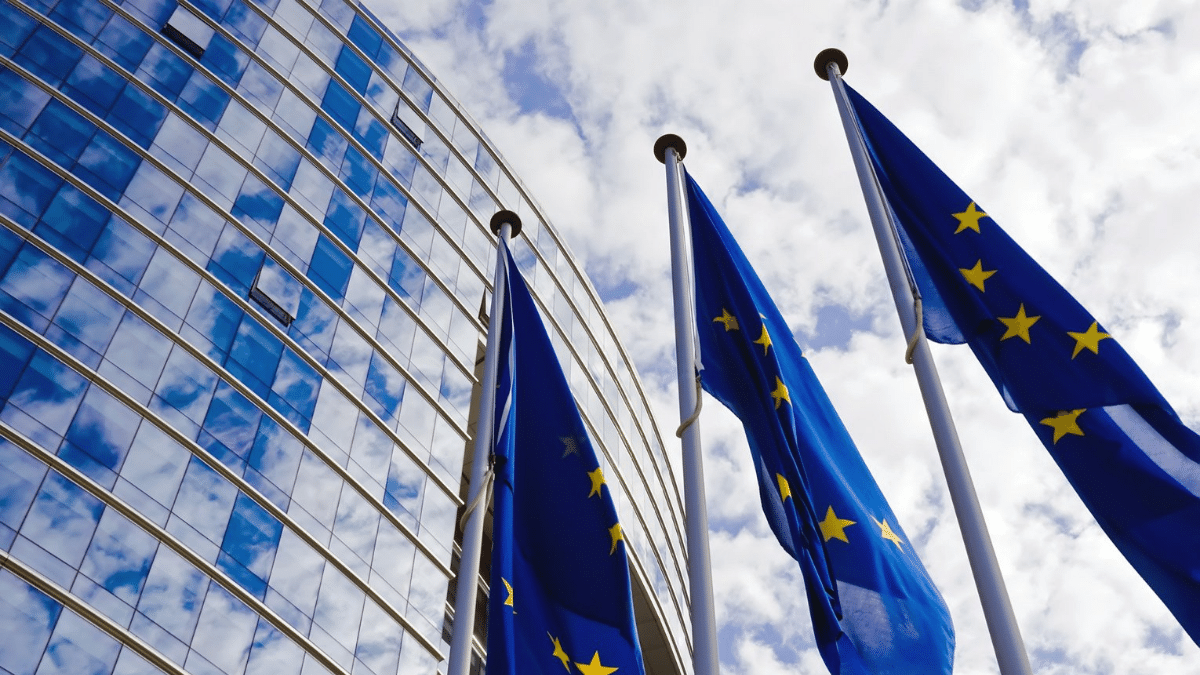
Over the past few years it has become increasingly clear that many government-led violations of LGBTI rights in EU Member States go hand-in-hand with an undermining of the rule of law and democracy. This includes in particular the degradation of the independence of judicial systems and the media landscape.
Particularly stark among this year’s submissions is the continual problem of non-implementation of European court judgments, especially around the right of LGBTI people to respect for their private and family life and the best interests of their children, as well as judgments related to legal gender recognition.
Efforts by authorities to restrict civic space; legal harassment, threats, hate speech and smear campaigns against LGBTI human rights defenders; and inadequate implementation of hate crime and anti-discrimination laws also remained prominent in 2023.
Treasurer’s report 2023
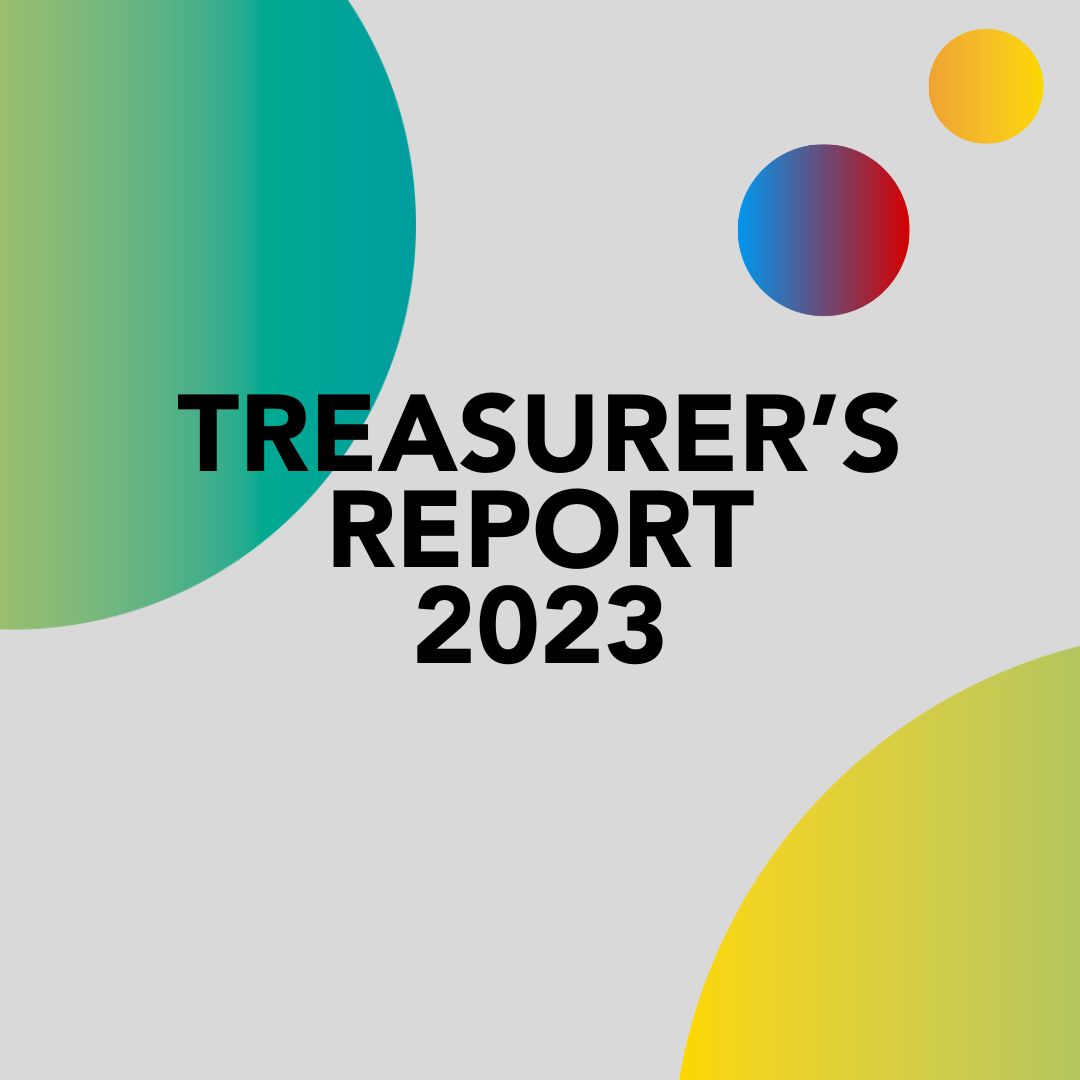
The projections for the financial year 2023 assumed a significant growth of the budget, new programmes and areas of engagement, return to regular operations without pandemic-related interruptions, and continued engagement on humanitarian and other support for Ukraine. Like in previous years, the work was a delicate balancing act of ensuring our long-term plans are implemented while creating space and time to respond to on-going developments and trends.
On top of that, the year 2023 was a year of major internal developments, including strategic planning for the following five years, and a leadership transition process. As you can read in our Activity Report, the ILGA-Europe team have carried out a hugely impressive amount of work. From further increasing our flexibility to support LGBTI organisations and expanding our connection with the movements in different countries and sub-regions, to bridging protection gaps and pushing for new and better legislations, standard-setting and helping translate laws into practice, we have been staying ahead of the curve.
We have committed to building and strengthening alliances to make sure LGBTI voices are an active part of collective actions for gender equality, decriminalisation of sex work, democracy, social rights. And we have taken important steps to engage more in the field of socio-economic justice.
Intersections: The LGBTI II Survey – Persons with Disabilities Analysis
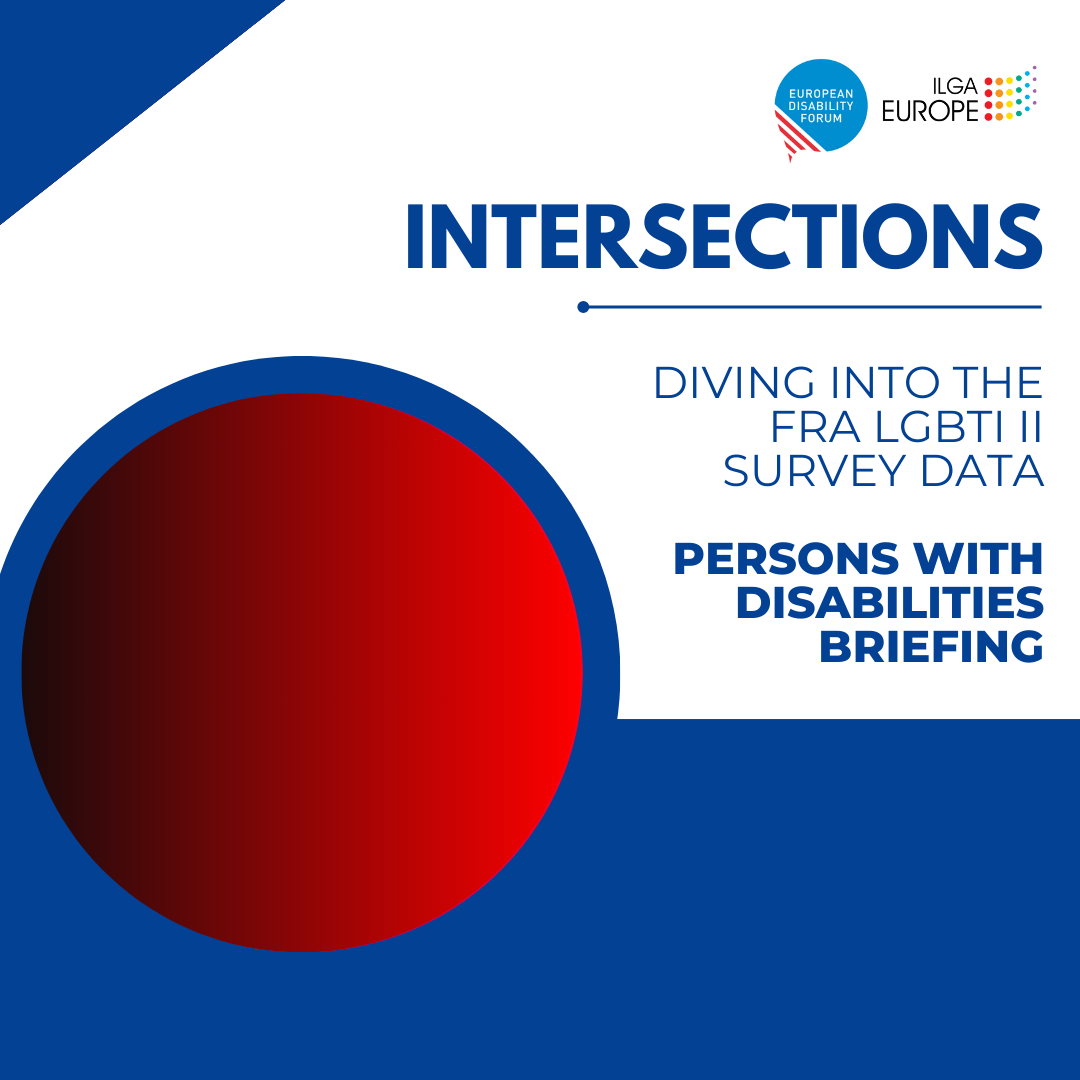
Disaggregated data, which can look deeply into the lived experiences of marginalised people, is a key demand of LGBTI and other human rights groups. With this in mind, over the last year ILGA-Europe have been partnering with a variety of NGOs in the region to analyse the FRA 2019 LGBTI Survey II data and pull out experiences of those experiencing intersectional marginalisation. This work is based on analysis co-commissioned by ILGA-Europe and TGEU.
This briefing analyses the results of the FRA LGBTI Survey II and summarises the most relevant data about the experiences of LGBTI persons with disabilities in Europe.
Intersections: The LGBTI II Survey – Homelessness Analysis

Disaggregated data, which can look deeply into the lived experiences of marginalised people, is a key demand of LGBTI and other human rights groups. With this in mind, over the last year ILGA-Europe have been partnering with a variety of NGOs in the region to analyse the FRA 2019 LGBTI Survey II data and pull out experiences of those experiencing intersectional marginalisation. This work is based on analysis co-commissioned by ILGA-Europe and TGEU.
This briefing analyses the results of the FRA LGBTI Survey II and summarises the relevant data about experiences of homelessness among the LGBTI community.
Intersections: The LGBTI II Survey – Bisexuals Analysis
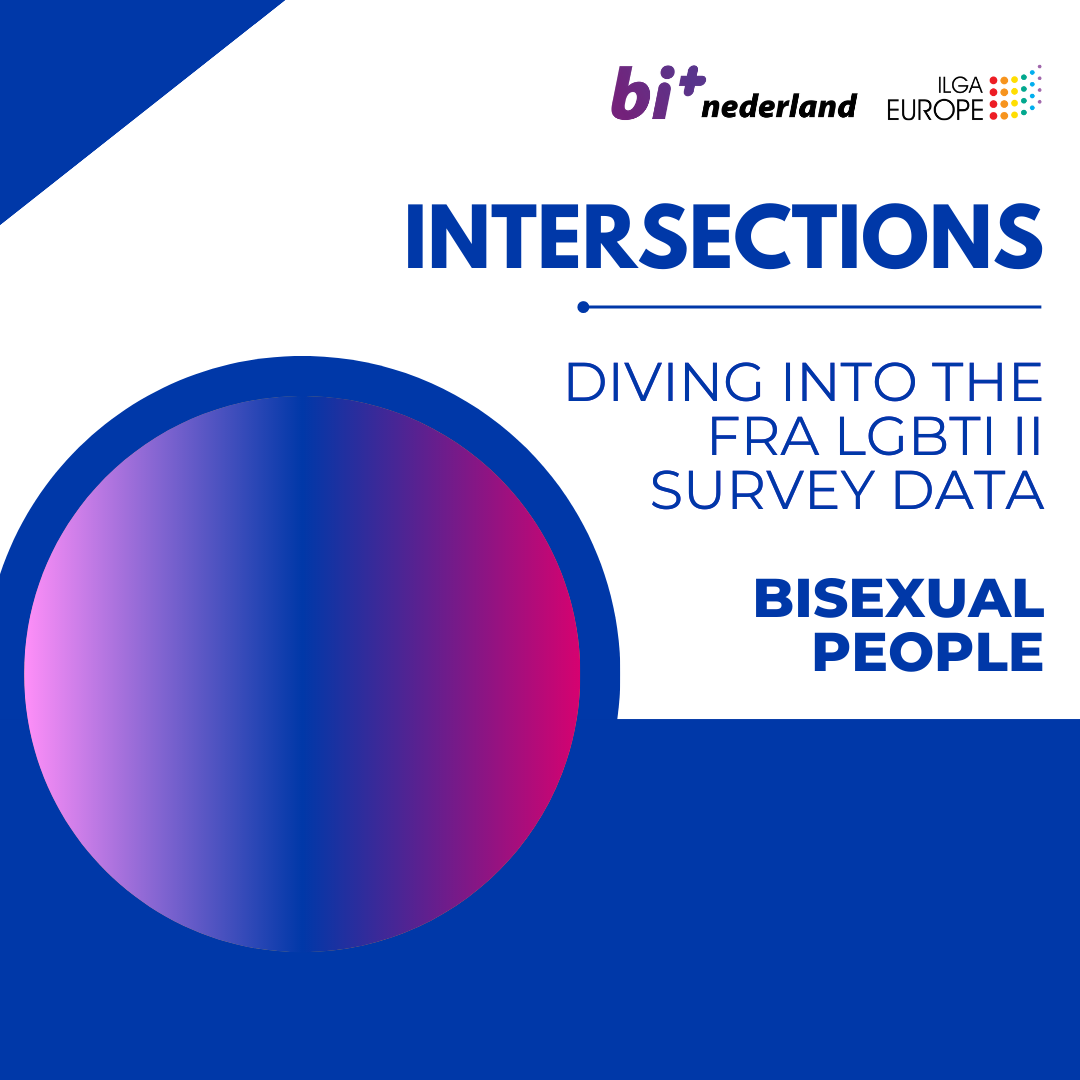
Disaggregated data, which can look deeply into the lived experiences of marginalised people, is a key demand of LGBTI and other human rights groups. With this in mind, over the last year ILGA-Europe have been partnering with a variety of NGOs in the region to analyse the FRA 2019 LGBTI Survey II data and pull out experiences of those experiencing intersectional marginalisation. This work is based on analysis co-commissioned by ILGA-Europe and TGEU.
This briefing summarises the findings of data analysis disaggregating the responses of bisexual people from the responses provided by all LGBTI respondents to the 2019 FRA LGBTI Survey II, in order to show the differences in their lived experiences compared to the overall community.
Intersections: The LGBTI II Survey – Migrant and Racial, Ethnic and Religious Minorities Analysis
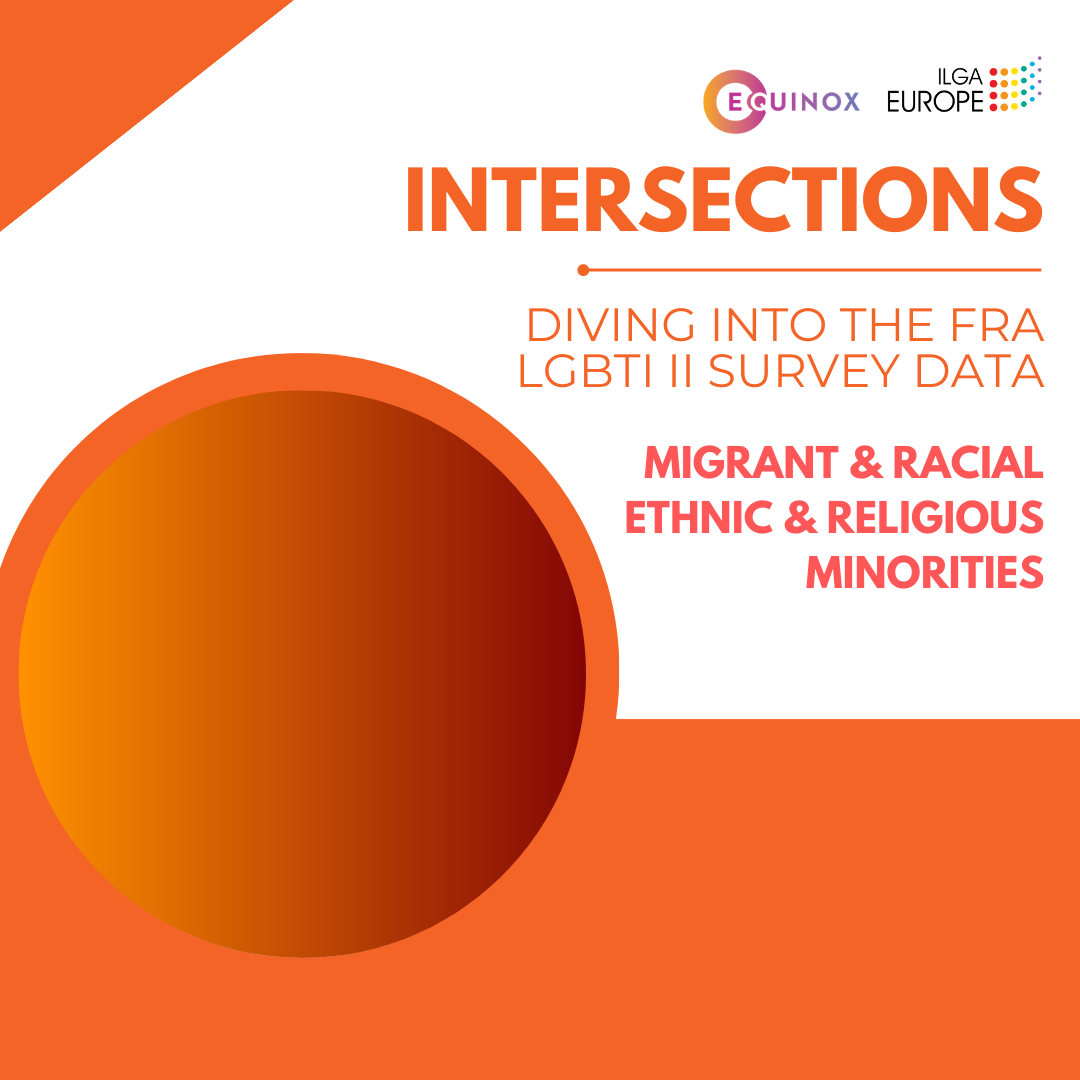
Disaggregated data, which can look deeply into the lived experiences of marginalised people, is a key demand of LGBTI and other human rights groups. With this in mind, over the last year ILGA-Europe have been partnering with a variety of NGOs in the region to analyse the FRA 2019 LGBTI Survey II data and pull out experiences of those experiencing intersectional marginalisation. This work is based on analysis co-commissioned by ILGA-Europe and TGEU.
This briefing seeks to elaborate on existing analysis of the FRA LGBTI Survey II, and summarises the most relevant data about the experiences of LGBTI persons in Europe with a migration background coming from outside of EU, LGBTI non-migrant ethnic minorities and LGBTI religious minorities in the EU.
To understand the challenges faced by LGBTI migrants from outside of the EU and belonging to ethnic or religious minorities, we created sub-populations of respondents, who identified themselves as belonging to these groups, and compared them with all respondents to the survey.
Intersections: The LGBTI II Survey – Trans and Non-binary Analysis
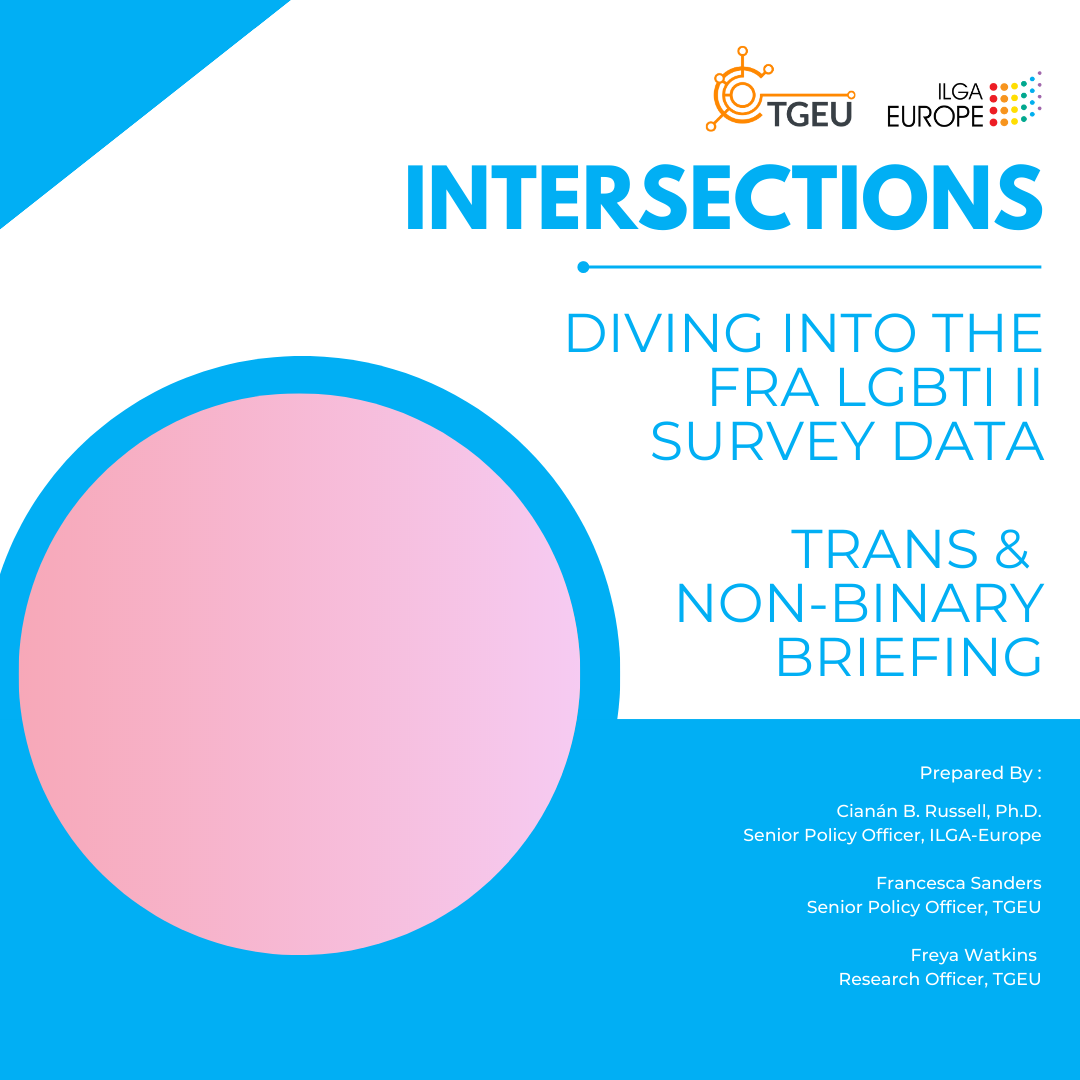
Disaggregated data, which can look deeply into the lived experiences of marginalised people, is a key demand of LGBTI and other human rights groups. With this in mind, over the last year ILGA-Europe have been partnering with a variety of NGOs in the region to analyse the FRA 2019 LGBTI Survey II data and pull out experiences of those experiencing intersectional marginalisation. This work is based on analysis co-commissioned by ILGA-Europe and TGEU.
This briefing on trans and non-binary people summarises the findings of data analysis disaggregating the responses of trans and non-binary people from the responses provided by all LGBTI respondents to the 2019 FRA LGBTI Survey II, in order to show the differences in their lived experiences. To understand the diverse challenges faced by trans and non-binary people, we created subpopulations of trans men, trans women, and non-binary people, and compared them with all respondents to the survey.
Despite limitations, this data set remains the largest available of trans and
non-binary people in Europe and provides a valuable insight into the experiences of a large number of trans and non-binary people across the EU. That it has been and will be repeated enables useful comparisons over time.
Overview of ILGA-Europe’s Finances in 2022
In the financial year 2022 ILGA-Europe obtained and recognized 3 687 082 € in revenues, which is approx. an 11% (over 365 000 €) increase from the 2021 revenues. Another 200 000 € in donations and approx. 600 000 € in core grants were received in the course of 2022 but carried over to 2023 and further, to secure more operational budgets in the nearest future. The majority of funding recognized in 2022 was sourced from long-term projects and grants, raised in the preceding years.
The 2016 – 2022 comparison (see chart below) of proportions of core funding, unrestricted funding (donations and sponsorships), operating funding (European Commission) and project funding recognized in each year shows that in 2022 ILGA-Europe continued to prioritize flexible resources. The share of unrestricted funding (core grants, unrestricted donations and sponsorships) increased significantly over the past years, but it should be noted that in 2022 the amount of unrestricted donations received was lower than expected (480 000 € in 2021 and 280 000 € in 2022). The income of the European Commission operating grant was increased slightly in 2022, and will further increase in 2023. 2022 marked the beginning of a new Framework Partnership with the EC, under which ILGA-Europe will soon begin re-granting.
The two core grants used throughout the year (Wellspring Philanthropic Fund – 417 670 € and Open Society Foundations – 200 000 €) corresponded to 24% of the total budget. The share of project funding (over 1.7M € in 2022) increased to 66% of the total budget, with more resources mobilized to answer specific needs, and in lieu of higher unrestricted incomes. Within this category of project funding ILGA-Europe included two grants which in their nature were core, but were earmarked for providing funding in response to the war in Ukraine.
In terms of project financing, the majority of projects active in 2021 continued into 2022, with only one stream of programmatic funding (Anonymous) was closed and not renewed, but replaced with a project from another funder. The highest non-flexible revenues recognized were issued by:
- European Commission (Operating Grant) – 1 000 000.00 €
- Global Equality Fund – 464 301.41 €
- Anonymous – 315 561.55 €
- The Government of the Kingdom of the Netherlands – 210 000.00 €.
While the previous financial years have been heavily affected by Covid-19 in terms of both revenues and our ability to process funds and carry out activities, 2022 cannot be analysed without the mention of the impact of the invasion of Ukraine. ILGA-Europe quickly shifted its work and budget to enable as much coordination and support as possible be offered to the movement in Ukraine and neighbouring countries. No active fundraising was carried out – given the significant number of ongoing fundraisers, ILGA-Europe prioritized mapping existing efforts and needs, in order to be able to channel donors to where resources were needed, where gaps occurred (especially keeping in mind wider reach and distribution of resources, in particular to groups with less access to donors).
At the same time, significant amounts of ILGA-Europe’s resources were earmarked for financial and other support to groups operating in and around Ukraine. Two core grants (with the total value of 210 688 €) were received and assigned to the purpose of supporting the LGBTI movement in those areas with subgrants.
Additionally, just over 9 000 € in extraordinary revenues was recorded from write offs, unreconciled refunds and round up differences. These are income items recognized largely at year-end. While they constitute unrestricted funding, ILGA-Europe limits their generation through internal controls, and they serve to balance any negative write offs, currency exchange balances and other similar losses.
The total of expenditures registered in financial year 2022 amounted to 3 606 265 €.
| Total 2021 Actual | Total 2022 Budget | Total 2022 Actual | |
| Staff costs | 1,762,609 | 1,867,737 | 1,844,873 |
| Office Costs | 277,169 | 324,087 | 335,052 |
| Gathering Online / Annual Conference | 60,009 | 408,600 | 398,980 |
| Board Meetings | 45 | 22,000 | 28,130 |
| Work Programme Costs | 266,038 | 340,700 | 264,652 |
| ILGA-Europe Capacity Dev. | 25,998 | 40,000 | 47,376 |
| Fundraising | 6,247 | 30,000 | 18,761 |
| Re-granting | 749,885 | 1,262,000 | 654,856 |
| Other and losses | 4,160 | 24,640 | 13,584 |
| TOTAL EXPENSES | 3,152,160 | 4,319,765 | 3,606,265 |
The audit of financial year 2022 took place in January 2023 and found no issues. It confirms recognized income of 3 687 082 €, expenses of 3 606 265 €, and a year-end result of 80 817 €. This year-end result was primarily sourced from unrestricted funds and extraordinary income.
Treasurer’s Report 2022
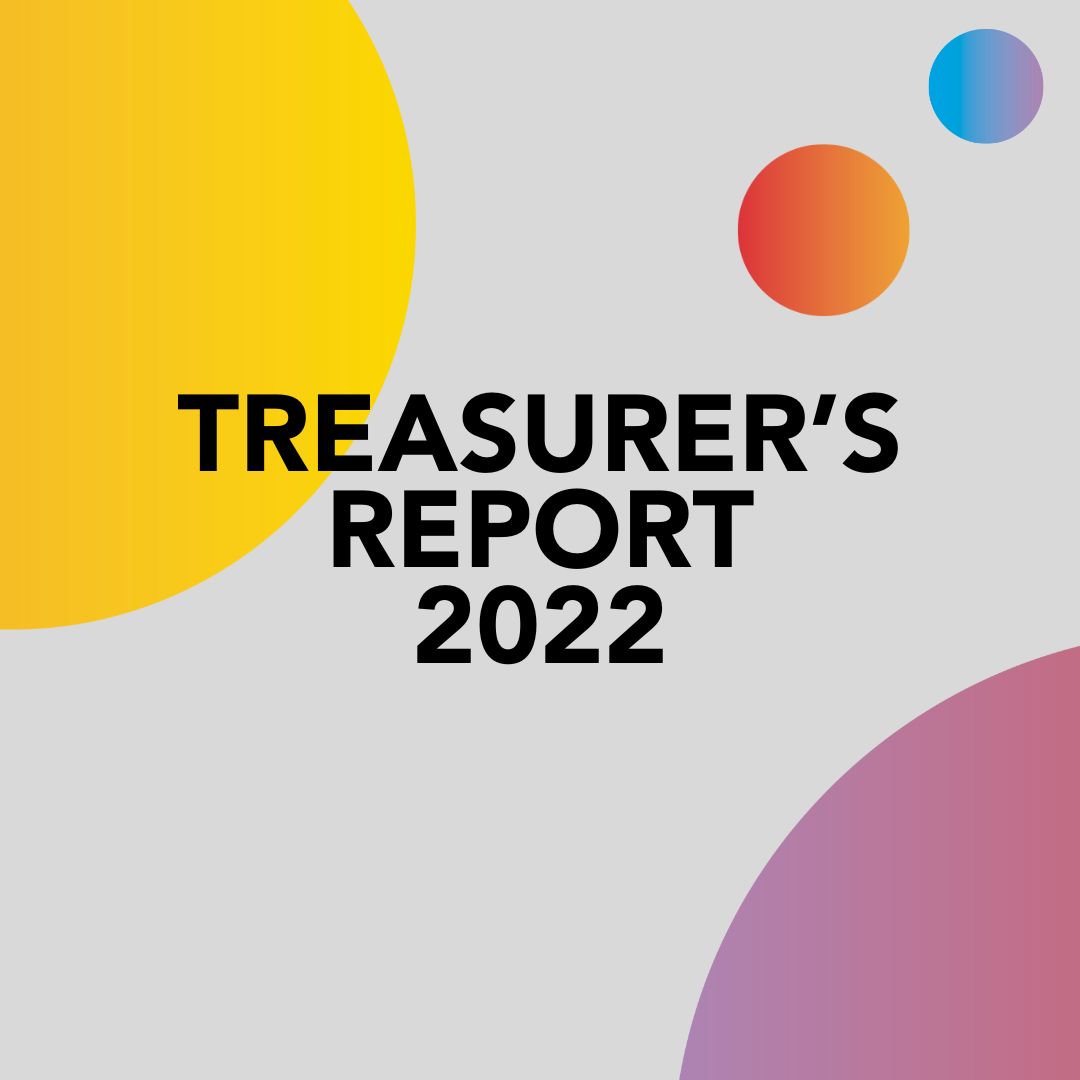
While the projections for the financial year 2022 assumed a steady growth of the budget, new programmes, and a slow but steady turn to regular post-pandemic operations, ILGA-Europe did not anticipate that Russia would launch a full-scale invasion of Ukraine. As a result, the work became a delicate balancing act, one which we had been in many ways prepared for by the COVID-19 pandemic two years earlier. ILGA-Europe understood from the outset that the war was not going to be a short-term situation for people in Ukraine, Russia, and neighbouring countries.
The team recognised that there would be particular vulnerabilities experienced by LGBTI refugees, and those LGBTI people who were either forced, or chose to remain in Ukraine and Russia. With this understanding, a significant amount of immediate time, resources and energy was required to respond – practically, financially and strategically – to the needs of LGBTI organisations both in Ukraine and across the region ILGA-Europe work in.
Resources were shifted and workplans were adjusted to align with these needs and realities. Some previously planned programmes and activities were delayed further into 2022 or, in some cases, into 2023. ILGA-Europe proved to be able to adapt to the context and make best use of existing resources. Significant funds were used for re-granting and providing other types of support to affected groups and organisations.
Rainbow Europe Map and Index 2023
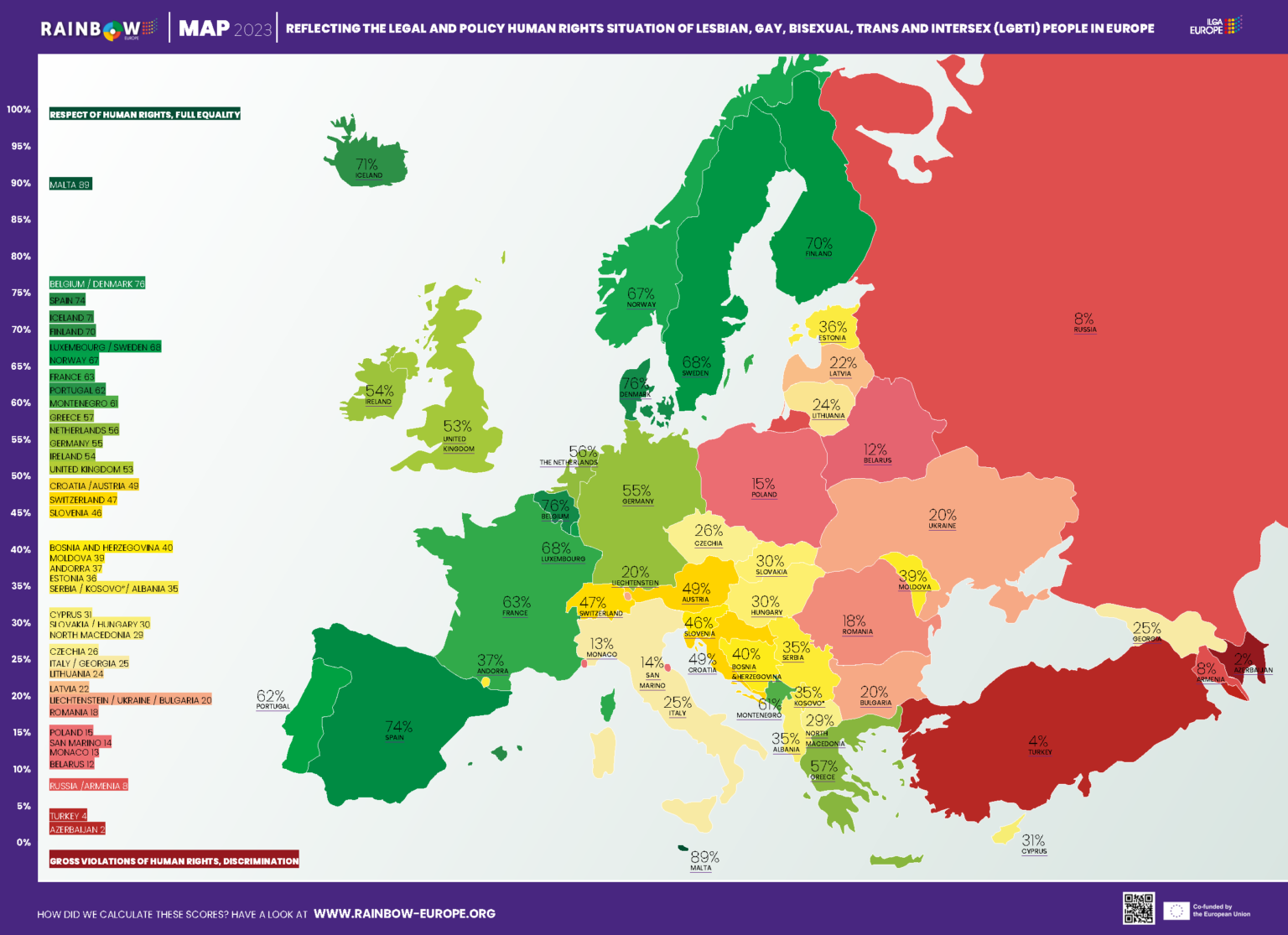
- Despite intense anti-LGBTI attacks in several countries, equality is still advancing across Europe.
- While the public discourse is becoming more polarised and violent, particularly against trans people, political determination to advance LGBTI rights is paying off. The largest gains on the map are for countries that introduced legal gender recognition using a self-determination model. Over the past 12 months bans on intersex genital mutilation (IGM) are also bringing countries up in the ranking.
- Spain jumped six places to number four with its introduction of LGR with self determination, alongside a ban on IGM, while Finland entered the top ten, again up six places, again with LGR based on self-determination. Greece has also moved up four places with its ban on IGM.
- Gender identity and sex characteristics are included in anti-discrimination and/or hate crime legislation, moving Belgium, Iceland and Moldova up the chart alongside Spain.
- Moldova has jumped 14 places because sexual orientation and gender identity have been positively included in legislation covering employment, education, provision of goods and services, health, hate crime and hate speech.
- Slovenia and Switzerland switched positions. Both countries introduced same-sex marriage and joint adoption. Switzerland also allows medically assisted insemination for couples. Croatia too moved up one spot with its introduction of adoption for same-sex couples.
Executive summary
Rainbow Europe – ILGA-Europe’s annual benchmarking tool – comprises the Rainbow Map and Index and national recommendations. ILGA-Europe have produced the Rainbow Map and Index since 2009, using it to illustrate the legal and policy situation of LGBTI people in Europe.
The Rainbow Map and Index ranks 49 European countries on their respective legal and policy practices for LGBTI people, from 0-100%.
In order to create our country ranking, ILGA-Europe examine the laws and policies in 49 countries using 74 criteria, divided between seven thematic categories: equality and non-discrimination; family; hate crime and hate speech; legal gender recognition; intersex bodily integrity; civil society space; and asylum. More information on the list of criteria and their weight on the total score can be found at www.rainbow-europe.org/about
Policymakers, researchers and journalists are able to go ‘behind’ the points and see the original information sources that we base our Map and Index ranking on. This additional layer of information is available through our updated Rainbow Europe web module, www.rainbow-europe.org.
The Rainbow Map and Index presents a picture of what the policy landscape is like currently, while our country-specific recommendations attempt to answer the question “what’s next?” These recommendations are intended to encourage policymakers to address the most pressing legal and policy priorities within the framework of our Rainbow Map and Index. The recommendations were gathered following an online consultation with a wide range of LGBTI organisations in the various countries. As a result, the recommendations are tailored to the needs of activists working on the ground.
- For the eighth year in a row, Malta continues to occupy the number one spot on the Rainbow Europe Map, with a score of 89%.
- With 76 points, Belgium now occupies the second place with a rise of four points due to the inclusion of gender identity and sex characteristics as aggravating factors in the country’s penal code.
- Denmark comes third palace with a score of 76 with the rise of two points due to its new equality action plan, which includes specific measures on sexual orientation and gender identity but falls short of inclusion of projects on sex characteristics.
- The three countries at the other end of the Rainbow Europe scale are Azerbaijan (2%), Turkey (4%), and Armenia (9%), exactly the same as the last three years. Among them, only Armenia increased an index point after revoking its ban on blood donations from men who have sex with men.
- Spain, Iceland, Finland, Moldova, Switzerland, and Croatia are the countries with the biggest jump in scores. Spain introduced a comprehensive law that regulates legal gender recognition (LGR) based on self-determination, banned genital mutilations on intersex minors, prohibited so-called “conversion” practices and outlawed discrimination based on sexual orientation, gender identity, and sex characteristics.
- Iceland adopted an equality action plan, included gender identity and sex characteristics in their equality law, and added sex characteristics protection in the penal code. Moldova also amended its equality law and penal code to include sexual orientation and gender identity.
- Finland adopted its Trans Law which regulates LGR based on self-determination.
- Switzerland’s legislation on marriage equality came into effect, which also gave the right to joint adoption and medically assisted insemination for same-sex couples. In Croatia, same-sex couples can now apply for joint adoption and second-parent adoption after a court decision.
Intersections: The LGBTI II Survey – Intersex Analysis
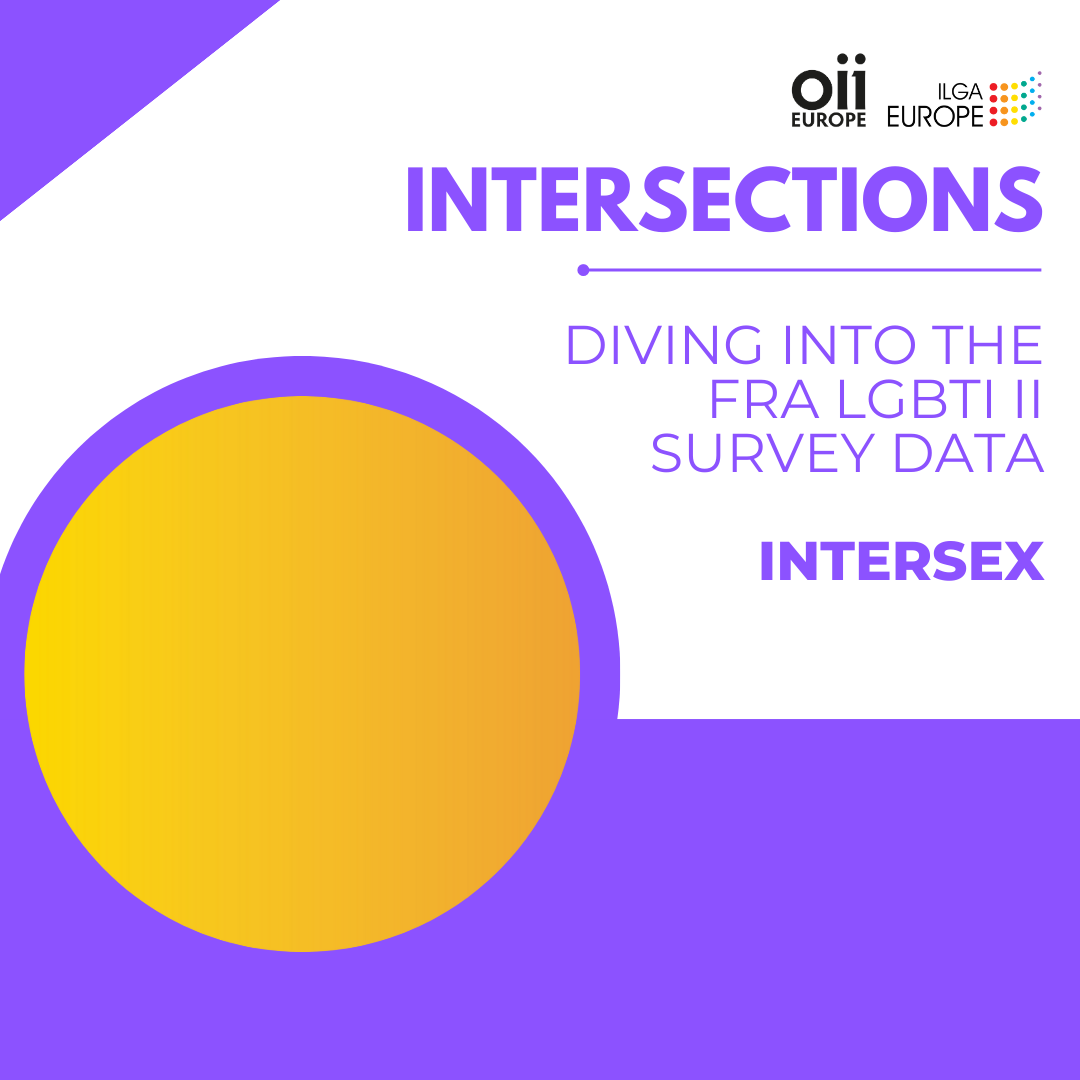
Disaggregated data, which can look deeply into the lived experiences of marginalised people, is a key demand of LGBTI and other human rights groups. With this in mind, over the last year ILGA-Europe have been partnering with a variety of NGOs in the region to analyse the FRA 2019 LGBTI Survey II data and pull out experiences of those experiencing intersectional marginalisation. This work is based on analysis co-commissioned by ILGA-Europe and TGEU.
This briefing on intersex people summarises the findings of data analysis disaggregating the responses of intersex people from the responses provided by all LGBTI respondents to the 2019 FRA LGBTI Survey II, in order to show the differences in their lived experiences.
In 2019, FRA conducted the second round of the LGBTI Survey which shows how LGBTI
people experience their fundamental rights in daily life across Europe. For the first time, the survey included the experiences of intersex people, and determined that intersex people experience some of the highest levels of discrimination across all groups included in the study.
This briefing on intersex people was developed collaboratively with OII Europe.
EU LGBTIQ Equality Strategy – Second year implementation evaluation
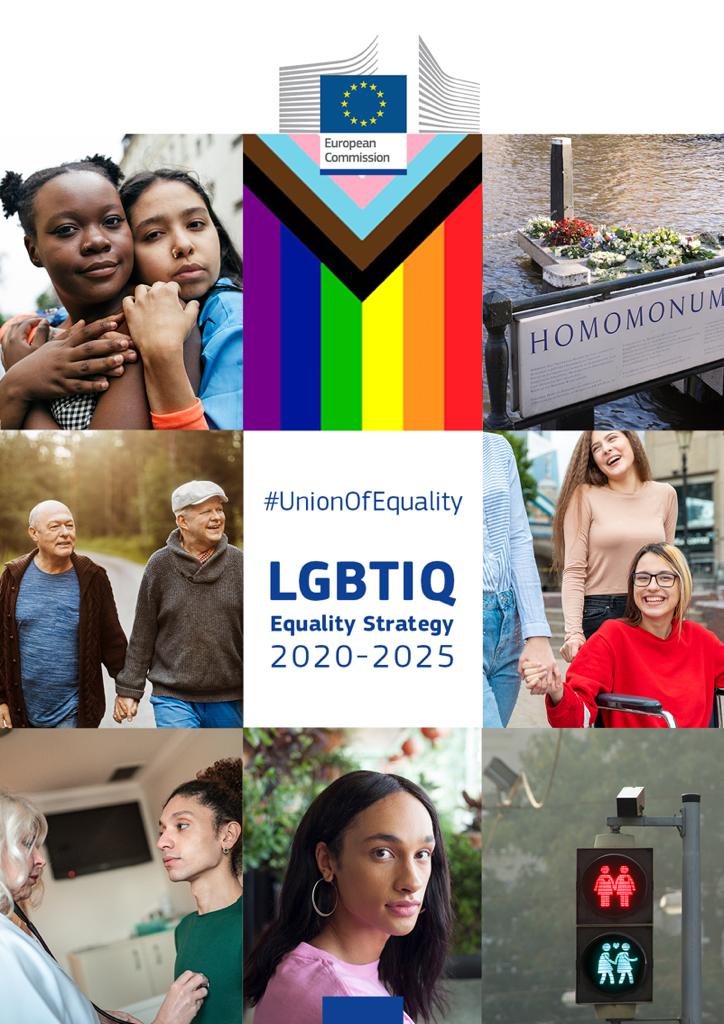
Half-way through, the evaluation of LGBTI organisations is positive, but also pointing clearly to where more is needed to ensure the implementation of the strategy in all areas of EU competence and to fully live up to the commitments the EC proudly adopted with the strategy.
With this briefing, ILGA-Europe wants to highlight five key aspects of our evaluation of the first two years of implementation and set out recommendations to ensure strong implementation of the full strategy by 2024.